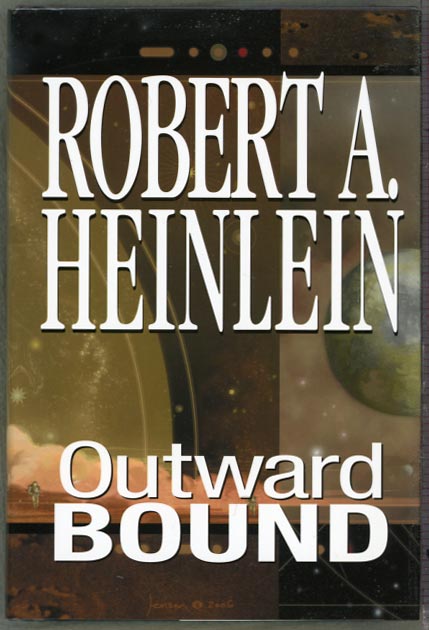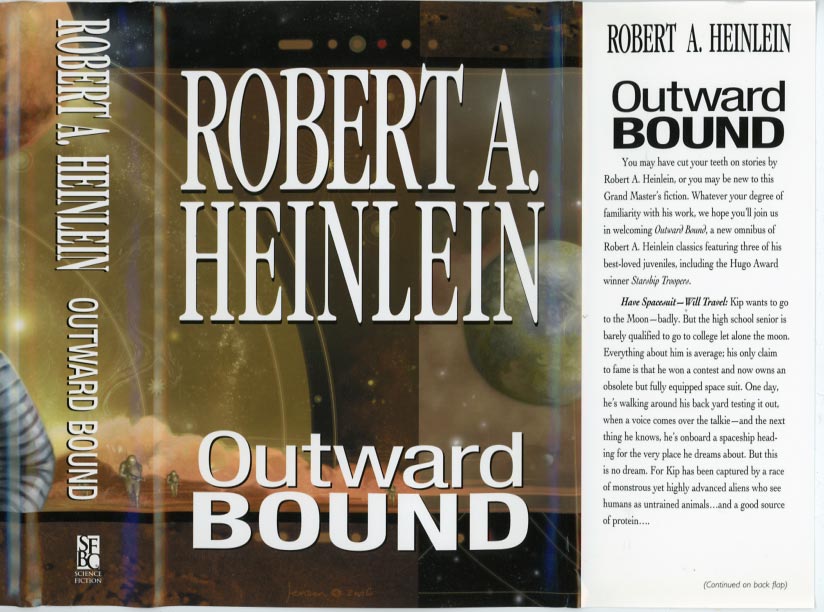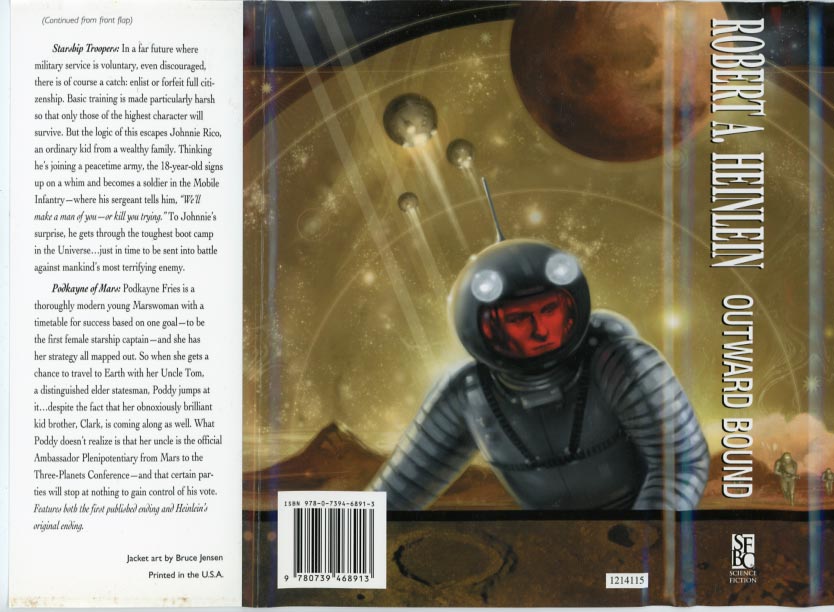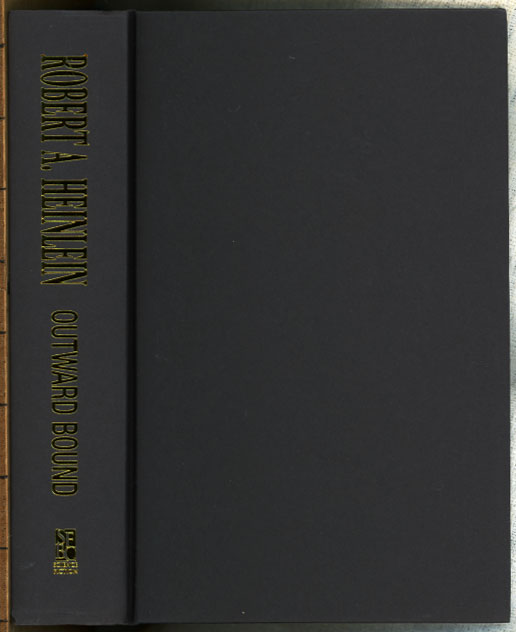
author:
title:
Heinlein, Robert A.
OUTWARD BOUND
(reprint) omnibus: 2006
edn-date:
printing:
format:
cvr art:
cvr price:
GRADING:
2006
Hardcover
Bruce Jensen
Book= Fine-
Dustjacket= Fine
omnibus of: HAVE SPACE SUIT - WILL TRAVEL (1958) + STARSHIP TROOPERS (1959) + PODKAYNE OF MARS (1963, with both endings: 1989 and original as published.)
Have Space Suit- Will Travel: serialized in The Magazine of F&SF August to October 1958. "You see, I had this space suit." Heinlein was the best ever at starting with a punchy first line that grabbed you and pulled you right into the book. Kip Russell is space mad, and makes a systematic effort at winning a contest where the 1st prize is "a trip to the Moon!" He doesn't win, but gets a spacesuit instead - a real one that had logged 800 hours during construction of the 2nd space station. He enjoys the challenge of putting it back in working order, until it was "like a fine car, its helmet like a Swiss watch."
While taking a final stroll in it before college, testing an echo-repeat radio rig, he is surprised to get an answer to his broadcast. The next he knew, a flying saucer lands almost on top of him, an alien tumbles out, and then he is kidnapped and on the way to the Moon! He achieved his wish of going to the Moon, but he never would have dreamed of a forced march on the surface. Things get complicated after that, and the stakes keep getting higher. This is marvelous fun - another of my favorites.
A side note: you may have seen the quote "Heinlein wears imagination as though it were his private suit of clothes." It was from a New York Times review of this book, and that review is reprinted as the first page blurb.
Robert A. Heinlein's second novel to win the Hugo award: Starship Troopers (1959.) A shorter version (missing at least one battle scene) was serialized in The Magazine of F&SF in 1959 - as "Starship Soldier."
At least once every generation, some Science Ficiton writer takes a serious look at why and how wars are fought, and this can form a sort of dialogue with other authors who have done the same. Heinlein's Starship Troopers and Joe Haldeman's The Forever War both involve wars of humans against aliens, the relationship of the military to the society which creates and supports it, and the use of infantry in Battle Suits as the ultimate way of getting results other than ship-to-ship combat or bombardment from orbit. Each book reflects the author's own experience in the military - with quite different emphasis and results.
I read this as a teen when I found it in the "juvenile" section of my library (even though it is NOT labelled a juvenile, it often gets lumped in.) For a decent plot summary, I'm quoting parts from a 4-page review by my favorite reviewer P. Schuyler Miller - in Astounding March 1960. [Much of the review focused on the idea that we should not mistake a well-written fiction for the author's own views, using Oliver Wiswell as an example]:
(...some day I'll finish this summary)
The "juveniles" by Robert A. Heinlein raised the bar on quality of SF for young people - with carefully worked out backgrounds and technical detail, interesting characters and plots that make you want to come along for the ride. Heinlein's juveniles were in a class of their own, and major SF magazines were happy to serialize them when they had a chance. Podkayne of Mars - (1963), when Heinlein was working with Putnam for all of his books, instead of Scribners for the juveniles.
Both the 1994 SFBC edition (based on a 1993 Baen printing) and the 2006 Outward Bound omnibus appearance - have the ending that Heinlein submitted [Putnam requested a revision] and the original ending that was printed in all editions prior to 1993. I happen to prefer the first published (revised) version, but I like the idea that this edition presents both versions. Either of these I would recommend for anyone who wants a nice, durable copy.
Podkayne Fries, known as "Poddy" is 8 years old by Martian reckoning (which makes her about 16 in Earth years) and cute and sassy with blond hair, blue eyes and an IQ of 145. Her brother Clark (aged 11 in Earth years) is a brat with an IQ of 160 who invariably outwits his sister. Poddy gets her dream of a trip to Earth through a series of mishaps involving the sudden arrival of triplet siblings. She and Clark travel with their Uncle Tom, former senator in the Martian government, with a stopover on Venus thrown in since the Tricorn makes a 3-legged trip. They end up having adventures and involved in political intrigue as motives are revealed for pressuring the Martian representative to the Three-Planets Conference...
[Shorter? magazine serial was in IF: 3 parts - November 1962, plus January & March 1963.] I would rank this in the middle of Heinlein's juveniles, quality-wise: not as good as his best or as bad as the worst. I liked it, and have read it several times. Here's a quote from P. Shuyler Miller's review (from Analog June 1963) which reveals some of the good and bad points:
"... With the aid of a politician uncle they finagle a vacation trip to Earth via Venus, and are presently up to their ears in melodrama - but unfortunately melodrama without suspense. Podkayne is too self-conscious a heroine to make her view of things more than amusing, or the events in which she is involved of much importance. There is one exception, as there is bound to be in a Heinlein book: a chapter near the middle in which Podkayne, with matter-of-fact teenage competence, wades into the hullabaloo of a spaceship load of babies floating in free-fall. While she is involved in this, Podkayne is a real person - and the emblem of the host of young people of sixteen who do cope without getting into the papers. Her Mars-centered views elsewhere in the book are amusing, and the logically strange interplanetary society is painted with the infallible Heinlein virtuosity, but Podkayne does not belong in the company of the "rolling" Stones... "


